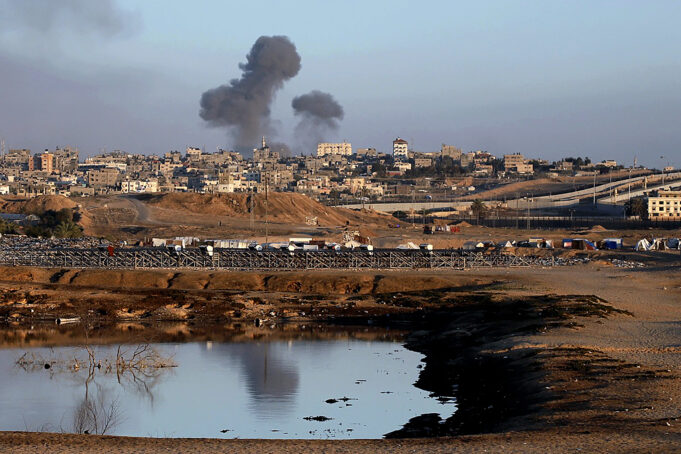In a shocking development, The Wall Street Journal (WSJ) reported that Egyptian officials said they are considering downgrading diplomatic relations with Israel by possibly pulling their country’s ambassador in Tel Aviv. One report said this action is more like an increasing domino effect, resulting from Israel’s invasion of Rafah.
“As we stand, there are no plans to suspend ties or throw away Camp David,” said another Egyptian official, referring to the Camp David Accords that led to the 1979 peace treaty between Egypt and Israel. “But as long as Israeli forces remain at Rafah crossing, Egypt will not send a single truck to Rafah,” reported WSJ.

Karim el-Gawhary, a journalist and head of the Observer Research Foundation Department of the Middle East said to Germany’s DW News, “The Egyptian side is very, very angry. They asked for weeks for (Israeli Prime Minister) Netanyahu not to do an incursion into Rafah. They pleaded to the Americans to stop this idea. Now it’s happening … Israeli operations in the immediate area of the Egyptian border.”
Karim el-Gawhary, who is based in Egypt, said, “(The) Egyptian border crossing of Rafah (now is filled) with Israeli tanks and soldiers stationed there.” He also mentioned the photos being circulated in the media “of Israeli tanks pointing their barrows towards the Egyptian side.
So, there is a lot of Egyptian anger.” This anger is also a big reason why Egypt recently joined South Africa’s case against Israel at the International Court of Justice (ICJ) in the Hague where the Zionist State is accused of genocide against the Palestinian people.
In a statement issued by the Egyptian Foreign Ministry, it explained that submitting a declaration of intervention in the lawsuit comes due to the worsening severity of Israel’s attacks against civilians within the Gaza Strip.
In addition, the Foreign Ministry added that Israel continues to commit systematic violence against the Palestinian people, including directly targeting civilians, destroying the infrastructure in the Gaza Strip, and pushing Palestinians to flee their land.
“Israel’s seizure of the Rafah crossing has also aggravated Egypt by removing one of the country’s points of leverage over Hamas and a key means for it to demonstrate its solidarity with Palestinians, say observers on both sides,” explained the WSJ. The article noted that an unnamed Israeli official said that providing aid to Palestinians and achieving a truce remained priorities for Egypt.
“There is no deal, and Israel is endangering (aid flows), it puts them in a really hard position,” the Israeli official said. “The fact that aid hasn’t come in, it’s bad for them, but it’s very bad for us,” noting that Israel is required by the ICJ to bring aid into Gaza.
This has led to an unprecedented humanitarian crisis that has created unlivable conditions in the Gaza Strip.
Adding to Egypt’s increased anger since Israel seized control of the crossing on May 7 and stepped up its military campaign around Rafah is that much-needed aid has accumulated on the Egyptian side of the border, Reuters reported.
“The key to preventing a humanitarian crisis in Gaza is now in the hands of our Egyptian friends,” Israel’s Foreign Affairs Minister Israel Katz said in comments released by his office.
Katz said he had spoken with his British and German counterparts about “the need to persuade Egypt to reopen the Rafah crossing.”
The Palestinian group Hamas, which has governed Gaza, will not “control the Rafah crossing,” Katz said, citing security concerns over which Israel “will not compromise.” The comments drew a swift and angry response from Egypt’s foreign ministry, which said Israel was responsible for the humanitarian crisis in Gaza and that Israel’s military operations in Rafah were the main factor blocking aid.
Mohammed Anwar Sadat, the nephew of the Egyptian president of the same name who negotiated the Egypt-Israel peace treaty of 1979, said the current dispute was the countries’ worst bilateral crisis since then.
“There is now a lack of trust,” said Sadat, a former member of Egypt’s Parliament. “And there is now a kind of suspicion from both sides actually,” he told the WSJ.
According to el-Gawhary, relationships between Egypt and Israel are very “frosty.”
“The Egyptians are saying basically that the Israeli incursion into Rafah violates existing treaties between the two countries, where it is stated that there should be some kind of demilitarized zone in the immediate border area. (This means) where there is no heavy weaponry allowed. The Egyptians say this is now violated.”
Follow @JehronMuhammad on X, formerly Twitter













